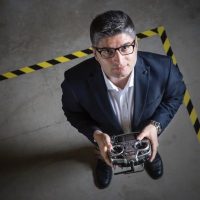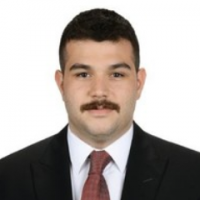Invited Speakers
Erdal Kayacan, Ph.D.

Tekin Meriçli, Ph.D.

Turgut Köksal Yalçın

Andrés Kecskeméthy, Ph.D

Aerial Robots: Challenges and Opportunities using model-based and model-free learning control techniques
Autonomous Logistics
Cobots in Home Appliances Manufacturing
Robotics Applications at the Human Interface
July 26th - 09:30
Abstract
Request for increased, almost perfect, accuracy and efficiency of aerial robots pushes the operation to the boundaries of the performance envelope and, thus, induces a need for reliable operation at the very limits of attainable performance. In model-based control, control accuracy highly depends on the representativeness of the model describing the system behavior. On the other hand, in real life, information one can learn from a system is always uncertain and limited in scope due to the noise from both inside and outside of that system as well as the limitations of our cognitive abilities. Even if an accurate model of the system is available, control system encounters various environmental conditions (such as humidity, temperature, etc.). The use of advanced learning algorithms, which can learn the operational dynamics online and adjust the operational parameters accordingly, might be a candidate solution to all the aforementioned problems. This talk will focus both model-based and model-free learning methods to handle various real-time aerial robot control problems. Furthermore, due to the cost associated with data collection and training, the topics related to approaches such as transfer learning can also be used to transfer knowledge between aerial robots and thereby increase the efficiency of their control. Not but not the least, some state-of-the-art drone applications, e.g. autonomous drone racing and fully autonomous cinematography system for aerial drones with the aim of letting the onboard artificial intelligence completely take over the film directing, will also be mentioned.
Biography
Erdal Kayacan received a Ph.D. degree in electrical and electronic engineering at Bogazici University, Istanbul, Turkey in 2011. After finishing his post-doctoral research in KU Leuven at the division of mechatronics, biostatistics and sensors (MeBioS) in 2014, he worked in Nanyang Technological University, Singapore at the School of Mechanical and Aerospace Engineering as an assistant professor for four years. Currently, he is pursuing his research at Aarhus University at the Department of Engineering as an associate professor.
He has since published more than 110 peer-refereed book chapters, journal and conference papers in model-based and model-free control, parameter and state estimation, and their robotics applications. He has completed a number of research projects which have focused on the design and development of ground and aerial robotic systems, vision-based control techniques and artificial intelligence. Dr. Kayacan is co-writer of a course book “Fuzzy Neural Networks for Real Time Control Applications, 1st Edition Concepts, Modeling and Algorithms for Fast Learning”. He is a Senior Member of Institute of Electrical and Electronics Engineers (IEEE). Since 1st Jan 2017, he is an Associate Editor of IEEE Transactions on Fuzzy Systems.
July 26th - 16:00
Abstract
Increased e-commerce activities and demand for faster and cheaper access to products, especially during the pandemic, have accelerated the adoption of various automation solutions in the logistics industry that faces huge problems with high costs, qualified workforce shortage, and low asset utilization. As a solution to these chronic problems, in this talk, I’ll describe how we apply various artificial intelligence and mobile robot technologies to build autonomous industrial vehicles that can operate in dynamic manufacturing plant and warehouse environments, and driverless semi trucks that can navigate long routes to transport their loads.
Biography
Dr. Tekin Meriçli is a well-rounded roboticist with in-depth expertise in machine intelligence and learning, perception, planning, and manipulation with more than 40 publications in these areas, some of which are best paper award recipients. He is a co-founder and the Chief Technology Officer of Locomation, a leading provider of automated driving technologies for the trucking industry. Before co-founding Locomation, he was a Special Faculty / Commercialization Specialist at the National Robotics Engineering Center (NREC) of the Robotics Institute (RI) at Carnegie Mellon University (CMU) working on developing various autonomy applications for ground and aerial vehicles in military and civilian contexts, search and rescue robots, and industrial processes. Prior to joining NREC as full-time staff, he was a Postdoctoral Fellow at the Human-Computer Interaction Institute (HCII) and the RI at CMU, leading efforts on autonomous manipulator systems for assisting elderly and disabled. He received his Ph.D. degree from the Department of Computer Engineering at Boğaziçi University, Turkey, and his MSCS degree from the Department of Computer Sciences at The University of Texas at Austin, USA. His knowledge and expertise in developing robust and efficient robotic systems have been sharpened through his participation in and contribution to various intelligent robotics competitions such as RoboCup, the DARPA Urban Challenge, the MAGIC UGV Competition, and the DARPA Robotics Challenge. He has also been very active in AI and robotics communities, serving as a referee and programme committee member of over 30 conferences and journals as well as co-organizing several national and international workshops, conferences, and competitions, including the RoboCup 2011 Istanbul event
July 27th - 09:00
Abstract
Cobots, which recently entered our lives, increased their usages drastically in a short period of time. They are used for painting cars, welding or assembly or even for cooking Turkish coffee. One other concepts that came together with the cobots is the term called “human-robot collaboration (HRC)”. It stands for accepting cobots as our new co-workers instead of some dangerous equipment behind the fences. Home appliances industry was one of the first adopters of the cobots and witnessed the entire progress of cobots.
Biography
After graduating from Tarsus American College he received his BSc degree from Sabancı University- Mechatronics in 2013 and MSc degree again from Sabancı University – Industrial Engineering (Machining) in 2015. Then joined Arçelik central production engineering department under automation team. Continuing his career in Smart Production Systems and Robotics division as industrial robotics technology team leader. Responsible for automation, robotics, image and signal processing projects as well as EU funded production Technologies calls and projects.
July 27th - 13:30
Abstract
While robots in industry are present since several decades, there is currently a new and rapidly expanding trend in bringing robots and humans more and more together. Examples are intelligent ride simulators, surgical manipulators, dexterous exoskeletons, soft robotics, humanoid walking devices, home robots, and many others. In this talk, two applications of robots at the human interface – which have been developed together with the RTU in the past – will be discussed: (a) passenger motion and transport using a serial robot, and (b) identification of human joint axes using tactile robots. The talk will give a general introduction to the area of robotics at the human interface and then discuss the specific scientific tasks for accomplishment of the two applications. These include: (a) singularity-robust navigation of the end-effector throughout the complete configuration space, (b) safe online control within the whole kinetostatic robot capabilities with warranted predictive avoidance of joint-limit emergency stops, (c) intelligent 3D motion planning for realistic motion sensation, and (d) self-aligning tactile feedback motion correction using Krylov subspace iterations. The talk will present the theoretical background, the algorithmic implementations as well as the experimental verifications for the two applications.
Biography
Professor Kecskeméthy was born in Lima, Peru and graduated from the University of Stuttgart in Mechanical Engineering in 1984, receiving his Ph.D. in Mechanical Engineering from the University of Duisburg in 1993. From 1994 to 1995, he stayed as a senior guest researcher at the Centre for Intelligent Machines at McGill University with a fellowship from the German Research Foundation (DFG). In 1996, Dr. Kecskemethy was appointed Professor at the Technical University of Graz, where he held the Chair for Mechanics until 2002. In 2002, Professor Kecskeméthy moved to the University of Duisburg-Essen, where he holds the Chair for Mechanics and Robotics at the Institute of Mechatronics and System Dynamics. He was Editor-In-Chief of the Journal Mechanism and Machine Theory from 2004 to 2015. He served as Dean of the Faculty of Engineering of and as Chairman of the Senate of the University Duisburg-Essen. His memberships include the German Engineering Association VDI and the International Federation for the Promotion of Mechanism and Machine Science IFToMM. Since 2013, he was IFToMM Germany Chair, and since 2020 he is IFToMM President for the term 2020-2023. Professor Kecskeméthy has worked in the areas of kinematics and dynamics of multibody systems, covering topics such as modelling and control of mechatronic systems, vehicle dynamics, design of legged machines, biomechanics, virtual reality and heavy-weight robotics. He is author of more than 220 proceedings and journal papers.
